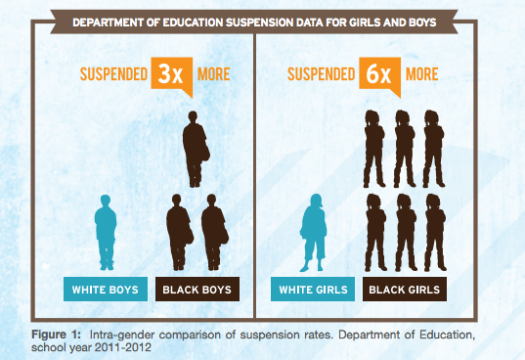Prison Prep For Black Girls…
Last week, the African American Policy Forum (AAPF) and Columbia Law School’s Center for Intersectionality and Social Policy Studies released a report titled “Black Girls Matter: Pushed Out, Overpoliced and Underprotected.”
The report found that while black boys were suspended three times more than white boys, black girls were suspended SIX times more than white girls.
For those of us who focus on ending the school-to-prison pipeline, this finding is unfortunately not a surprise. The trend toward the increasing criminalization of black girls in schools and society is not new.
Recently, Dr. Connie Wun published a very good article (PDF) about the role of anti-black racism in school discipline and punishment for girls. I highly recommend reading the article for a better understanding of how & why black girls are particularly targeted for harsh punishment in schools.
Regular readers might recall that I wrote about a Black girl named Dorothy Young a couple of years ago. Dorothy was sentenced to a reformatory for allegedly cursing at a white boy in 1969:
For allegedly calling a white boy a “bastard,” telling him where to kiss her and using the words “damn” and “goddamn” on a school bus, Dorothy Young, 14, of Sylvester, Ga., is confined indefinitely to a reformatory known as the Regional Youth Development Center in Sandersville, Ga. She is the first child sent there from her county in three years.
Dorothy’s sister, Yvonnne, 11, was accused of using similar profane language to a white boy a year older than she and is serving a year’s probation.
You can read the rest of Dorothy and her sister’s stories here to see how schools have played a role in criminalizing black girls for decades. Unfortunately as the “Black Girls Matter: Pushed out, Overpoliced, and Underprotected” report makes clear this issue remains undertheorized and too often neglected since the focus has been disproportionately on the criminalization of black boys in schools. However with scholarship like Dr. Wun’s and the report by AAPF along with on the ground organizing, maybe we will begin to better address black girls’ needs and concerns.

